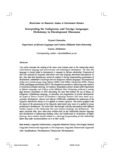Please use this identifier to cite or link to this item:
https://cris.library.msu.ac.zw//handle/11408/1301| Title: | Interpreting the indigenous and foreign languages dichotomy in development discourse | Authors: | Charamba, Tyanai | Keywords: | Linguistic determinism, Linguistic relativist theory, Downright/Radical Linguistic determinist Development, Linguistic Determinist Approach with Qualifications, Development, Democratic Development. |
Issue Date: | 2014 | Publisher: | Midlands State University | Series/Report no.: | Repositioning the Humanities: Journal of Contemporary Research;Vol. 1 No. 1; p. 133-156 | Abstract: | This article evaluates the validity of the views some scholars hold on the relationship which exists between language and socio-economic and technological development. The view that language is closely linked to development is rampant in African scholarship. Proponents of that view advocate for linguistic determinist view that language determines development. In fact, they hold that development cannot be realized if during implementing programmes of development, stakeholders use foreign and not indigenous African languages. The proponents of that view include among many: Mazrui (2000), Prah (2000), Chimhundu (2001), Mutasa (2006) and Magwa and Mutasa (2007). The viewpoint in question is influencing some students in institutions of higher learning. For instance, Rwaendepi, a former student of the Department of African Languages and Culture at the Midlands State University, produced a seventy page honours dissertation in 2012 advocating the view that without the use of Shona, an indigenous Zimbabwean language, in education and programmes of societal development, the people of Zimuto District of Zimbabweís Masvingo Province will never attain socio- economic development. Mazrui and Mazrui (1998) have established the weaknesses of the linguistic determinist theory as it is applied to human cognition. This article grapples with the degree of the genuineness of the linguistic determinist view when it is applied to issues pertaining to development. The article does that through critically appreciating what different scholars propose on the relationship that exists between language and development. The paper concludes that, since what some scholars hold on the relationship between language and development is influencing budding critics and intellectuals in institutions of higher learning, those scholars should embark on a thorough foregrounding of that relationship before they make recommendations on it in their works. | URI: | http://hdl.handle.net/11408/1301 | ISSN: | 2312-945X |
| Appears in Collections: | Research Papers |
Files in This Item:
| File | Description | Size | Format | |
|---|---|---|---|---|
| charamba.pdf | Full Text | 16.96 MB | Adobe PDF |  View/Open |
Items in MSUIR are protected by copyright, with all rights reserved, unless otherwise indicated.



